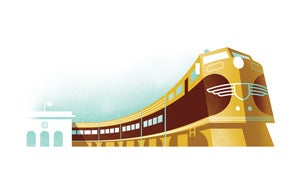This past spring, a stalwart of the School of Business retired from the College after 29 years of service. Howard Rudd, who was the school’s founding dean in 1986, inspired a generation of students with his focus on real-world business leadership. And his example of scholarship and practicality also inspired many of his fellow faculty members – as can be seen in these creative remarks given by a colleague in honor of Rudd’s last lecture.
by Thomas Kent
The train sat like a hulking creature charging at its tethers as though it couldn’t wait to get on to its next destination. Snorting steam from its nostrils and belching black smoke, it seemed to know the time for its task to begin was approaching.
The crowd shuffled on the platform. They had all arrived to wish him well and bon voyage. It was time. He could see this day coming for years. But it was never time. There was always more to do. But now – it was time. It had been coming on for a long time; but then it happened. The time to go just showed up. The time just arrived – like this train.
And now the crowd talked amongst itself. Some murmuring quietly, some laughing uproariously, remembering silly moments from days gone by so long ago. Some trying not to give voice to those secret eruptions of regrets for things said or done, for moments of thoughtless cruelty. Most not knowing what to say, how to put in a word decades of fondness, of thankfulness, of admiration.
After all, what do you say to a man who gave unselfishly, who gave credit but never demanded it, who elevated others above himself, who connected most of these people on the platform with each other for their benefit, not for his.
And so he moved Charlie Chaplinesque from soul to soul, almost apologizing for putting them in this terrible position. This awkward stance. Once again, he was taking care of them and ignoring his own self. As he had for all these years.
The years flew by, as they say, with hardly a word of gratitude. It took this moment, this black hole of time on this forlorn platform that marked his leaving yet not quite gone – not yet on the train – to wake them up. All that he had done, all that he stood for, the way he was, who he was, became suddenly clear.
For so long, he was the heart of the place. He gave it birth, he breathed life into it, he sustained it. He was its soul as well. Its spirit arose from him and its conscience took form from him. He was its sinew that connected the parts to each other lest they become detached from each other and from the heart.
Wait, I see now. You can’t go now. Not now. What will we do? What will become of us? Maybe the train will break. Maybe he’ll change his mind. It’s not too late.
What if he didn’t get on the train? Would things be any different? Would we be any kinder? Would we be able to show him how important he is to us? Would we be able to say – we love you?
Ah, and that is what had most of the gatherers at least slightly afraid. What will become of us? Oh, we’ll go on. But go on to what? That emptiness sends a shiver down a few spines.
But now the shrill whistle blows and the conductor calls out. The train seems to shudder as tethers tighten under the strains of the beast.
“All aboard.” The creature lurches once and the tethers strain. Last farewells are spoken. The creature huffs and bellows. It moves as the tethers break free. It’s really moving slowly now, then faster as the creature gathers its legs. They wave, Bon voyage.
Howard, you are my mentor, my role model, my conscience, my pal. See ya, old buddy.
– Thomas Kent is a professor of management and entrepreneurship and worked with Howard Rudd for 14 years.





